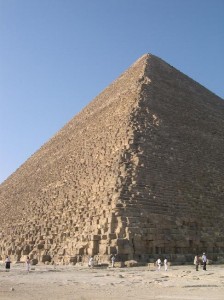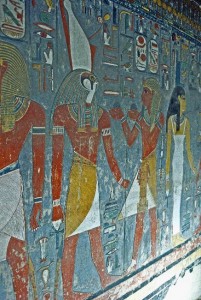 In March’s ERE Expo (San Diego) I’ll be presenting the final general session on Vision and its relationship to what we do. This topic was inspired by the recent democratic Egyptian revolution in Egypt. It really made me think about so many things and I wanted to share some of them with you. At the conference I’ll share much more about my thoughts on this, but for now I’ll concentrate on the subject of having Vision and how, in so many ways, the Egyptian revolution is a result of visionary recruiting.
In March’s ERE Expo (San Diego) I’ll be presenting the final general session on Vision and its relationship to what we do. This topic was inspired by the recent democratic Egyptian revolution in Egypt. It really made me think about so many things and I wanted to share some of them with you. At the conference I’ll share much more about my thoughts on this, but for now I’ll concentrate on the subject of having Vision and how, in so many ways, the Egyptian revolution is a result of visionary recruiting.
Let me start by saying that Vision drives who we are, what we do, and how we do it. This is a classic but important lesson in the art and science of talent acquisition.
My career has serendipitously taken turns and roads that have ultimately driven me to make Vision (capitalized throughout for emphasis) a part of my life and my work. As a left-brained engineer I am compelled by data, analysis, numbers, processes, and strategic tools to always achieve whatever my work desires. But, as someone who will always view himself as a recruiter in the core — that is, a specialist in the science and art of selling Vision, my right and more perspective-driven brain demands that I always consider the larger picture in all that I do. It’s a never-ending conflict between the two hemispheres.
 This ongoing, internal conflict that I’ve lived with for my entire career has been instrumental in both my work-life and beyond. It has consistently forced me to always ask tough questions and to encourage others to do the same: Who am I? What do I want? Are human actions random or are they part of a precise series of factors predisposed to theories of the physical sciences? (Yep, I really asked myself that one time, but I couldn’t answer it! Shocking!)
This ongoing, internal conflict that I’ve lived with for my entire career has been instrumental in both my work-life and beyond. It has consistently forced me to always ask tough questions and to encourage others to do the same: Who am I? What do I want? Are human actions random or are they part of a precise series of factors predisposed to theories of the physical sciences? (Yep, I really asked myself that one time, but I couldn’t answer it! Shocking!)
One thing I now truly and deeply believe and can provide ample empirical evidence to support is that Vision can be one of the greatest drivers of work and life for any who choose to create it and adopt it.
A few weeks ago, my Egyptian friends and associates implemented a Vision that they had long possessed. That Vision has driven them to extraordinary lengths and extenuating circumstances. Their Vision spoke of human rights and dignity. It spoke of democracy and universal values that can never be denied. It spoke of a free society and the right to self-determination. And it spoke of many more things that we in America take for granted.
Centered in their Vision and hidden in the crevasses of their actions was the task of recruiting: That is, the task of acquiring those who shared or agreed with their Vision. Is too much of a stretch to define it that way?
What is recruiting, other than the passing on of a particular idea or vision of the future? “If you work with us, you will have more time to spend with your family” one might say. “If you join our organization you will make a better salary that will allow you a more comfortable life, less stress, and more resources to do the things you want to do, when you want to do them,” another would argue.
Aren’t these Visions in their own right? Recruiting, at its core, when performed strategically, is nothing more than the promotion and selling of a vision to provide value to one or more entities. That entity can be a person, a team, a whole organization or a whole country, and the value can be reciprocal.
Yet, we as recruiting leaders often do not have a vision of our own even though so much depends on our actions. So much as it is relevant to the course of our departments, our organizations, our industries, our countries and ultimately humanity itself depends on our ability to recruit the best talent.
 You see, when we recruit we do not create automatic success for the organizations or groups that we recruit for. So much of the success depends on the decisions that are made by the people we help provide to our clients, employers, etc.
You see, when we recruit we do not create automatic success for the organizations or groups that we recruit for. So much of the success depends on the decisions that are made by the people we help provide to our clients, employers, etc.
But, we do create the possibilities of success. Actually, we not only create them, we have a virtual monopoly on them.
Let us define a “possibility” as the potential to achieve a given goal — that is, the chance we can achieve it. Nothing revolutionary here! Let us use this definition for this example.
You are the VP of talent acquisition for a successful and fast-growing company. The CEO decides that we have to move into a new market, specifically China, as soon as possible. She asks for a meeting with you. In that meeting she asks you “How likely are we to be able to start a China branch by the next quarter (from the talent perspective)?” You, being the savvy recruiter that you are, ask, “Well, what do we need, what can we afford, and how much resources can we dedicate.” In other words you’re asking if this is a true priority. Your CEO says, “Whatever it takes.”

You go back to your office, perform your incredible analysis, create a plan, and you review it with your CEO. Basically, it’ll take a lot of resources, a lot of time and effort, but you’ll be able to do it in the time required. Good Job! You are #awesomeness!
At the same exact time your twin sister/brother, in the same exact position, with an almost identical company at almost the same time, and the same conversation with their CEO, responds differently to the CEO’s question. This savvy recruiter replies “Oh. We’re ready now! We’ve been recruiting individuals with Asian market experience, and some are fluent in Mandarin. Additionally, we’ve been working closely with HR to identify knowledge and training gaps in anticipation of this move.”
Yes, both scenarios depend on a lot more than just recruiting (e.g strategy, leadership and talent management), but the key point is that recruiting for the second case created possibilities that did not exist for the first case because of the Vision that existed before the decision was made. One company can move to China now and the other has to wait. Recruiting the right people for the second case allowed the company to have an extra possibility for success than the first, and when the CEO made the right decision (hence, expansion to China) the possibility was seized and became a reality. Science fiction? Not really!
In this case its very clear to me that recruiting does control the possibilities that talent could seize if they make the right decisions, and that when Vision is inserted those possibilities are maximized.
So what does this have to do with us? And what does it have to do with the world at large?
The earliest recruiters were themselves ones who provided visions to their candidates. The Pharaoh Kings were tasked with the recruitment of their subjects into their national building projects. Many of the wonders of the World were built first by building human infrastructure to sustain the development of global symbols, which are forever known throughout human history. History itself is filled with some incredible recruiters. So from Pharaohs to revolutions it doesn’t make a difference, recruiting is always central.
How can many of us, then, not see the relationship between what we do every day and its effects on the course of human socio-economic, geopolitical evolution?
It doesn’t have to be a Wonder of the World, nor does it have to be a national or global symbol, in order for us to know that we are essential in managing humanity’s path. It could be the non-profit recruiter who recruits talented volunteers and professionals to raise and create awareness for a disease that has taken the life of many. She/he is directly involved with saving lives.
It could be the military recruiter who recruits individuals who protect our nation and keep us safe, while re-habilitating many members of our society. It could be the technology recruiter who recruits engineers and scientists to create a fun product that brings joy to the lives of millions of people who would otherwise be miserable. These are all social changes in which we play a nominal role and in which we can influence so much.
But now we come full circle: How can we provide these Visions (higher salaries, protection of our nation, cool technologies, helping others) to our candidates when we ourselves do not have a Vision of our own?
Really! Why do we do the things that we do? How can we provide something that we ourselves do not possess? Vision!
The members of the recent Egyptian revolution recruited an entire society to their Vision of the future. They did it using the social media tactics that we ourselves employ in our daily lives. And their result was a tech-savvy, driven, emotionally intelligent, team-oriented, and humble sourcing sample that provided the foundation for true and lasting social change. Many of them wouldn’t know the first thing about recruiting, as we do. They simply had Vision and allowed it to be self-propagating.

For an organization that wishes true success built on the timeless foundation of top talent, the lessons that can be learned from this are exceptional. Though, the most important lesson is Vision and its necessity for those who wish to change the world for better, even if it’s the small changes that one might falsely think are insignificant.
I have so much more to say about this in the upcoming ERE Conference in March, where I will provide you with my Vision and ask you to provide yours.